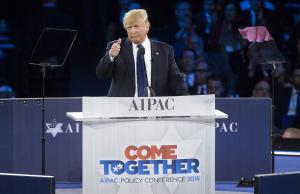WASHINGTON, April 15 (UPI) — A member of the Rules Committee for the Republican National Convention has proposed a set of changes that could drastically alter how the party selects its nominee in Cleveland this summer.
John Yue, a committee member from Oregon who has not endorsed any of the candidates, proposed using the Roberts Rules of Order, a handbook that governs many civic and non-profit organization meetings, as the means by which the convention should conduct its business. While seemingly arcane, the proposal would be a significant departure in several practical ways from the existing procedure, which is based on how the House of Representatives conducts its daily business.
Under Roberts, any of the roughly 2,500 delegates to the convention could make an objection that would then need to be voted on by the full body. Yue told Politico allowing the delegates more power instills the greatest measure of transparency at what increasingly looks to be the first brokered GOP convention in a generation.
Under the present system, a majority of the decisions with how the convention proceeds rests with its chairman, House Speaker Paul Ryan.
Opponents say allowing any delegate to object to proceedings at any time could gum up the convention with procedural problems and lead to a days-long morass — while the country watches, waiting for the party to select its nominee.
Under Yue’s plan it would also be more difficult for a so-called “white knight” candidate to emerge if the convention deadlocks between Donald Trump and Sen. Ted Cruz, the leaders in the delegate count. Under Roberts Rules, it requires a majority of the voting body to undo previously settled points of order, such as which candidates are eligible to be selected. That means a candidate who is not on the first ballot would need to secure his or her majority before even entering the balloting in a subsequent round.
Yue argued earning a majority of delegates in their first time on the ballot is the best way to prove the nominee was truly the choice of GOP delegates and not party leaders seeking to install their preferred general election candidate.
Existing GOP rules also make the “white knight” scenario more difficult. A rule already on the books requires the nominee to have won a majority of delegates from at least eight states. In this race, that would preclude everyone except Trump and Cruz — including Ohio Gov. John Kasich, who is still in the race but has won one primary to date. Republicans have said it is likely, given the prospect of a deadlocked convention, they may revisit the eight-state rule before the convention if it is clear no candidate has the outright majority needed to win.
Yue’s proposal comes two days after another Rules Committee member, Randy Evans, said if Trump enters the convention with at least 1,100 delegates, but short of the 1,237 needed to win the nomination, he would win it anyway.
“If Donald Trump exceeds 1,100 votes, he will become the nominee, even though he may not have 1,237,” Evans said on MSNBC.
The comments raised eyebrows and the RNC later clarified no candidate will win without a majority of delegates.
Evans said he was expressing an opinion that Trump would receive the backing of GOP superdelegates that would put him over the top if he arrived in Cleveland just shy of a majority.
A spokesman for the RNC quickly clarified the rules would not be altered to allow any candidate to win the nomination with less than 1,237 delegates, a majority of those at the convention.

COMMENTS
Please let us know if you're having issues with commenting.